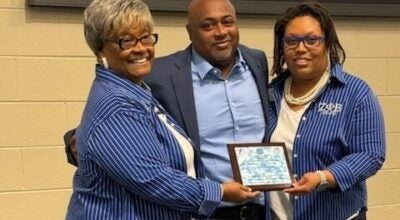Sewell praises launch of Black Belt wastewater project
Published 2:38 pm Friday, October 16, 2020

- Rep. Terri Sewell, D-AL, talks with Willie May Spivey, a homeowner in Tyler. Spivey purchased her home in 1979 and was supposed to have a septic tank system. Alabama Public Health officials stated that Spivey’s home had a straight pipe septic system. . After a neighbor complaint, workers with the health department were able to contact the Alabama Onsite Wastewater Association, and was able to obtain a free system. The soil on Spivey’s property was characterized as “good soil” which helped her odds of obtaining one of the 11 free septic tanks given by the association each year statewide.
|
Getting your Trinity Audio player ready...
|
U.S. Rep. Terri Sewell, D-AL, is celebrating the launch of a wastewater project in the Black Belt by Columbia World Projects, with has provided a $710,000 investment to pilot a new approach to wastewater treatment that is “equitable, technically feasible and financially sustainable for underserved, low-income communities.”
“I am grateful to Columbia World Projects for their investment in my district and in Alabama’s rural Black Belt to address the challenges posed by failing wastewater infrastructure,” Sewell said in a press release. “This project will build upon the progress my office has made over the years to secure vital federal funding for cost-effective rural sewer and wastewater systems. In Alabama and many rural communities across the country, failing septic tanks and deteriorating wastewater infrastructure has left an untold number of families with untreated sewage in their yards and local waterways. I have seen this crisis first-hand in the Black Belt. Thanks to this outstanding project, Alabama’s 7th Congressional District will serve as a model for how we can successfully address the health and environmental impacts of failing wastewater infrastructure by providing rural Americans with affordable decentralized wastewater treatment systems that work.”
Columbia World Projects is an initiative at Columbia University aimed at mobilizing university researchers and scholars to work with governments, organizations, businesses and communities to tackle “global challenges.”
The Black Belt project is a collaborative effort with the University of Alabama, the University of South Alabama, Auburn University and others.
“This project brings together university researchers and rural communities in Alabama to tackle a long-standing source of inequality – the lack of affordable, reliable wastewater services,” said Columbia World Projects Director Nicholas Lemann in the release. “Closing this gap will not only be good for the health, environment and livelihoods of people living in these underserved parts of Alabama – as Representative Sewell has long fought to do – but also may serve as a model for communities across the world grappling with similar challenges.”
The press release from Sewell’s office noted that failing wastewater and sanitation systems is a problem across the country, which leads to “contaminated water supplies, parasitic infections and environmental degradation.”
“The wastewater challenges in the rural Black Belt region of Alabama are particularly acute, further exacerbating pervasive inequalities across the region,” the press release stated.
The new project, with the help of local communities and newly-emerging technology, will investigate and quantify the negative impacts of wastewater system failures, design and pilot a “clustered, decentralized wastewater treatment system based on new technology,” develop new models and tools to enable other communities to address their wastewater challenges and produce best practices for adopting new financial and operational models for wastewater treatment.
Sewell has long advocated for upgrades to sanitation systems in the Black Belt, most recently though her Decentralized Wastewater Grant Act, which would establish a grant program to allow low- and moderate-income households to connect their homes to existing wastewater infrastructure or install or upgrade existing systems.
Sewell’s efforts date back to 2013, when she assisted White Hall, a town in nearby Lowndes County, in securing a $1 million grant and $112,000 loan to connect 50 homes and businesses to municipal lines.
Since then, Sewell has secured billions in additional funding for wastewater infrastructure programs and introduced multiple pieces of legislation aimed at addressing the issue.





